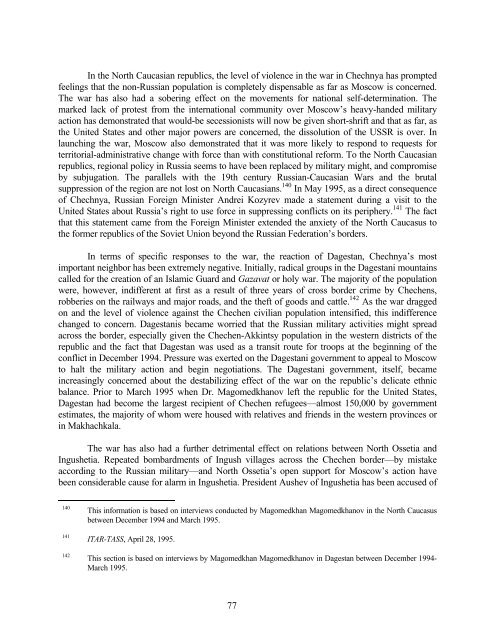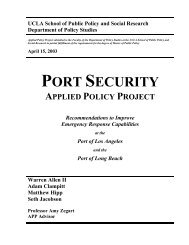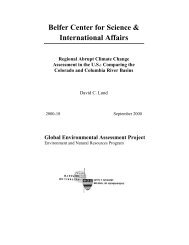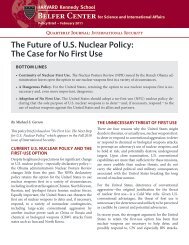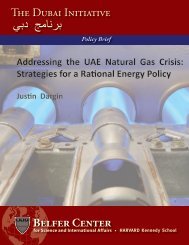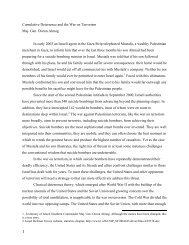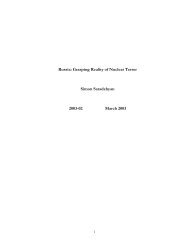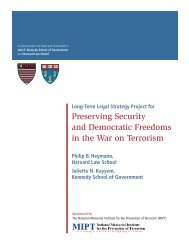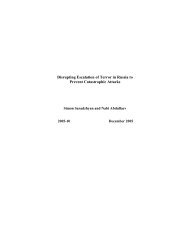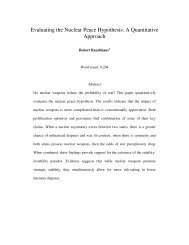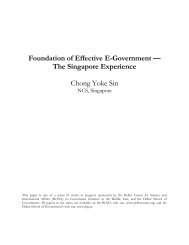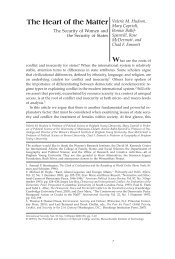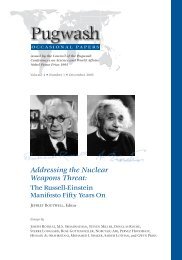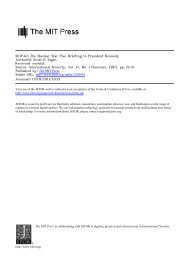RUSSIA'S TINDERBOX - Belfer Center for Science and International ...
RUSSIA'S TINDERBOX - Belfer Center for Science and International ...
RUSSIA'S TINDERBOX - Belfer Center for Science and International ...
You also want an ePaper? Increase the reach of your titles
YUMPU automatically turns print PDFs into web optimized ePapers that Google loves.
In the North Caucasian republics, the level of violence in the war in Chechnya has prompted<br />
feelings that the non-Russian population is completely dispensable as far as Moscow is concerned.<br />
The war has also had a sobering effect on the movements <strong>for</strong> national self-determination. The<br />
marked lack of protest from the international community over Moscow’s heavy-h<strong>and</strong>ed military<br />
action has demonstrated that would-be secessionists will now be given short-shrift <strong>and</strong> that as far, as<br />
the United States <strong>and</strong> other major powers are concerned, the dissolution of the USSR is over. In<br />
launching the war, Moscow also demonstrated that it was more likely to respond to requests <strong>for</strong><br />
territorial-administrative change with <strong>for</strong>ce than with constitutional re<strong>for</strong>m. To the North Caucasian<br />
republics, regional policy in Russia seems to have been replaced by military might, <strong>and</strong> compromise<br />
by subjugation. The parallels with the 19th century Russian-Caucasian Wars <strong>and</strong> the brutal<br />
suppression of the region are not lost on North Caucasians. 140 In May 1995, as a direct consequence<br />
of Chechnya, Russian Foreign Minister Andrei Kozyrev made a statement during a visit to the<br />
United States about Russia’s right to use <strong>for</strong>ce in suppressing conflicts on its periphery. 141 The fact<br />
that this statement came from the Foreign Minister extended the anxiety of the North Caucasus to<br />
the <strong>for</strong>mer republics of the Soviet Union beyond the Russian Federation’s borders.<br />
In terms of specific responses to the war, the reaction of Dagestan, Chechnya’s most<br />
important neighbor has been extremely negative. Initially, radical groups in the Dagestani mountains<br />
called <strong>for</strong> the creation of an Islamic Guard <strong>and</strong> Gazavat or holy war. The majority of the population<br />
were, however, indifferent at first as a result of three years of cross border crime by Chechens,<br />
robberies on the railways <strong>and</strong> major roads, <strong>and</strong> the theft of goods <strong>and</strong> cattle. 142 As the war dragged<br />
on <strong>and</strong> the level of violence against the Chechen civilian population intensified, this indifference<br />
changed to concern. Dagestanis became worried that the Russian military activities might spread<br />
across the border, especially given the Chechen-Akkintsy population in the western districts of the<br />
republic <strong>and</strong> the fact that Dagestan was used as a transit route <strong>for</strong> troops at the beginning of the<br />
conflict in December 1994. Pressure was exerted on the Dagestani government to appeal to Moscow<br />
to halt the military action <strong>and</strong> begin negotiations. The Dagestani government, itself, became<br />
increasingly concerned about the destabilizing effect of the war on the republic’s delicate ethnic<br />
balance. Prior to March 1995 when Dr. Magomedkhanov left the republic <strong>for</strong> the United States,<br />
Dagestan had become the largest recipient of Chechen refugees—almost 150,000 by government<br />
estimates, the majority of whom were housed with relatives <strong>and</strong> friends in the western provinces or<br />
in Makhachkala.<br />
The war has also had a further detrimental effect on relations between North Ossetia <strong>and</strong><br />
Ingushetia. Repeated bombardments of Ingush villages across the Chechen border—by mistake<br />
according to the Russian military—<strong>and</strong> North Ossetia’s open support <strong>for</strong> Moscow’s action have<br />
been considerable cause <strong>for</strong> alarm in Ingushetia. President Aushev of Ingushetia has been accused of<br />
140 This in<strong>for</strong>mation is based on interviews conducted by Magomedkhan Magomedkhanov in the North Caucasus<br />
between December 1994 <strong>and</strong> March 1995.<br />
141 ITAR-TASS, April 28, 1995.<br />
142 This section is based on interviews by Magomedkhan Magomedkhanov in Dagestan between December 1994-<br />
March 1995.<br />
77


